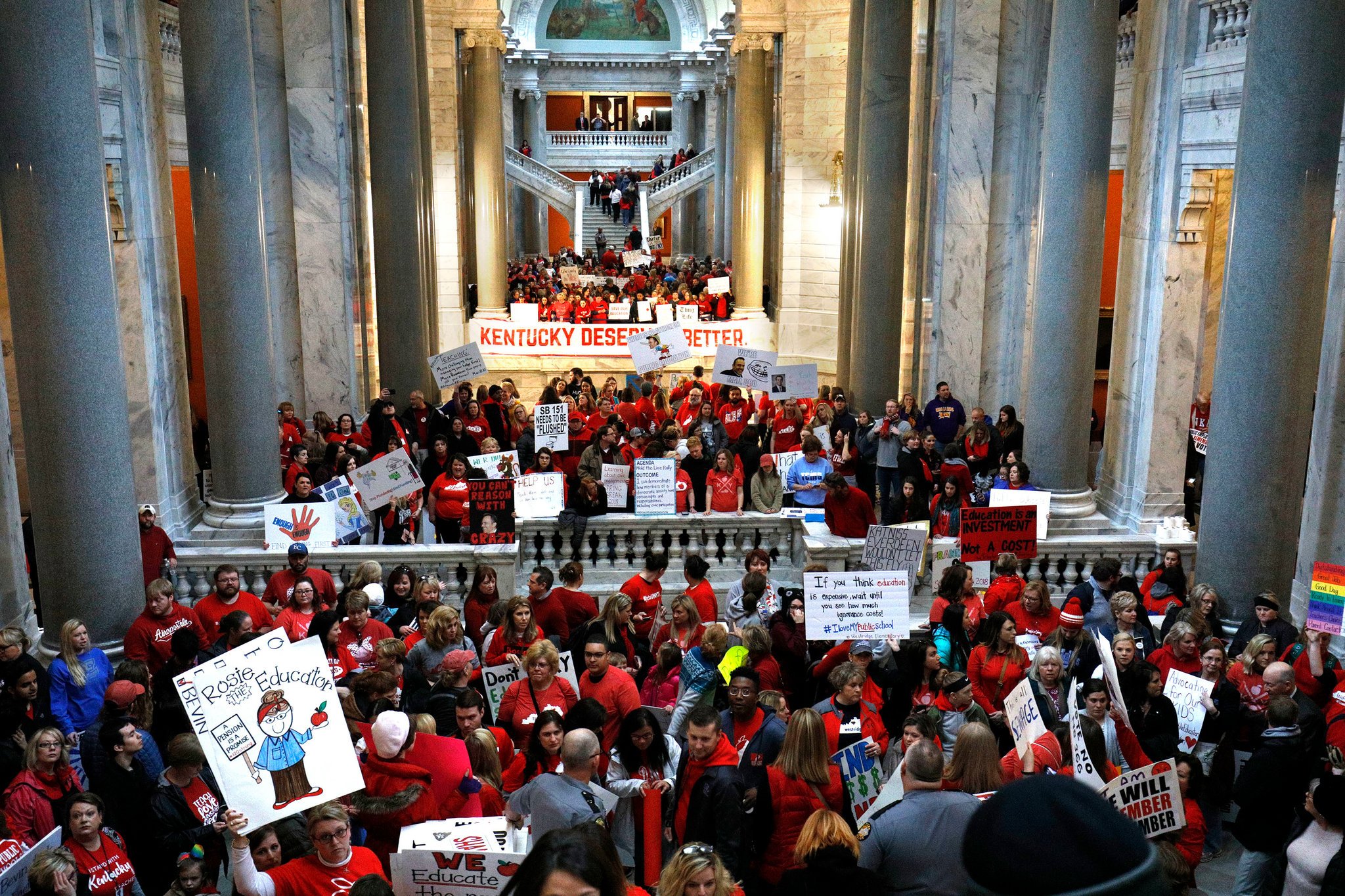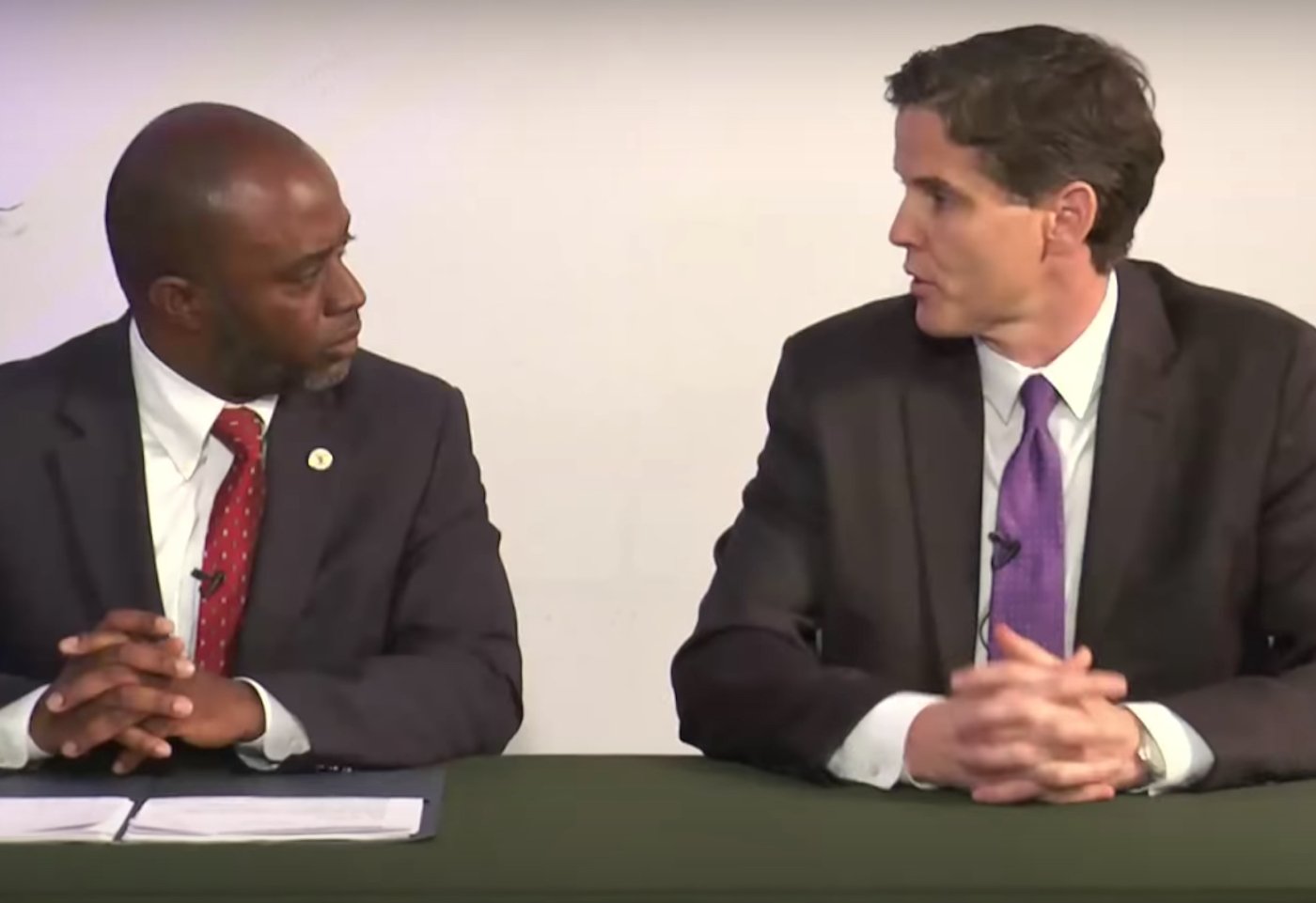Update 11/15/2018: When this post was first published, it appeared that Kathy Hoffman, the Democratic candidate for Arizona’s State Superintendent of Public Instruction, had been narrowly defeated by her opponent, Frank Riggs. However, mail-in ballots shifted the tally in her favor in the week following the election and she was declared the winner on Monday, November 12th.
Scores of teachers running for office in four states which were roiled by teacher walkouts earlier this spring were unable to translate the energy and enthusiasm behind those strikes into electoral victories on Tuesday night.
Over the past six months, the dominant narrative in the media has been that the teacher walkouts in West Virginia, Oklahoma, Kentucky, and Arizona signaled a shift in the political landscape of these traditionally conservative, GOP-controlled states. And public education advocates, particularly the American Federation of Teachers (AFT) and National Education Association (NEA), promised to capitalize on public support for the #RedForEd strikes by electing a wave of educators to state office.
Just because the walkouts are over, doesn’t mean the educator activism stops. In fact, most educators who have taken action are ready to #RememberInNovember and legislators are feeling the heat. https://t.co/ZGMqG4ohKA
— AFT (@AFTunion) May 24, 2018
However, an analysis of election returns reveals the predicted wave turned out to be more of a ripple. Of the 103 teachers identified by Education Week as candidates for legislative office in West Virginia, Oklahoma, Kentucky, and Arizona, only thirteen ended up winning their elections.
Here’s a breakdown of the results in each of the four states…
West Virginia: 7 Losses / 3 Wins
This year’s outbreak of strikes started in West Virginia back in February after the state affiliates of AFT and NEA called on teachers to walkout to demand higher pay and lower health care costs. The ensuing strike shuttered school districts across the state for nearly two weeks until West Virginia lawmakers agreed to fund a 4% across-the-board pay raise and pledged to freeze health insurance premiums.
Although the strike was widely characterized as a big victory for labor, the educators running for office in West Virginia were unable to sustain that momentum into November. Only three of the ten teacher candidates won their elections on Tuesday and one of them was an incumbent lawmaker.
wpDataTable with provided ID not found!Oklahoma: 60 Losses / 6 Wins
After a decade of stagnant wages and steep cuts in K-12 funding, teachers in Oklahoma brought the state’s public education system to a halt for nine days in April as they swarmed the state capitol to demand a long-overdue pay raise and increased revenue for schools. While state legislators eventually agreed to a $6000 pay boost for teachers and an additional $1250 for support staff, they refused to raise taxes for schools.
However, most of the concessions made by lawmakers were passed before the strike even began, leading some to question whether the walkout really accomplished anything. As Gregg Garn, dean of the college of education at the University of Oklahoma, told the New York Times, “In the long run, if candidates that support education get elected, that’s what will determine who won or lost.”
Is it Nov. 6 yet? #oklaed #okleg #RememberInNovember #TogetherWeAreStronger #RedForEd pic.twitter.com/NtTk5S56ea
— OK Education Assoc. (@okea) October 20, 2018
Unfortunately for teachers, by that measure they lost. Of the sixty-six teachers who ran for legislative office in Oklahoma, only six were elected on Tuesday night. Moreover, any hope that the teachers running for office might boost the number of Democratic seats in the legislature was dashed as four of the six educators elected are Republicans.
wpDataTable with provided ID not found!Kentucky: 17 Losses / 3 Wins
Although the strikes that rattled Kentucky were less widespread than those in West Virginia and Oklahoma, teachers were still able to compel the GOP-controlled legislature to not only pass a record funding increase for schools, but to override a veto of their budget plan by Kentucky Governor Matt Bevin.

However, as in West Virginia and Oklahoma, support for the teachers strike did not translate into votes for teachers running for state office. Only three of the twenty teacher candidates pulled off a win on Tuesday night – and two of the three were Republicans.
wpDataTable with provided ID not found!Arizona: 6 Losses / 1 Win
Teachers closed schools across Arizona for five days in a strike over their salaries, which were among some of the lowest in the country. Although they initially demanded a 20% raise from lawmakers, teachers eventually agreed to Arizona Governor Doug Ducey’s offer of a 19% pay increase spread out over three years.
Ducey easily won reelection on Tuesday with nearly 60% of vote, but it was a very different story for those teachers running for the state legislature: only one of the seven candidates managed to win.
wpDataTable with provided ID not found!Traditional public education advocates also suffered a loss in the race for State Superintendent of Public Instruction. Democratic candidate Kathy Hoffman, a speech therapist from outside Phoenix who was backed by the Arizona Education Association and Arizona Federation of Teachers, was narrowly defeated by her Republican counterpart, Frank Riggs. (See the update at the top of this post)

The one bright spot in an otherwise dismal election night for Arizona teachers was the defeat of Proposition 305, a ballot measure that would have vastly expanded the state’s education savings account (a.k.a., voucher) program. Voters overwhelmingly rejected the proposal by a margin of 2-to-1.

Other Notable Races: Colorado & California
Finally, let’s turn to some notable races in other states, beginning with Colorado, where a series of walkouts closed schools across ten districts over a two-week period, but never became as widespread as in Arizona. The disruptions eventually ended when lawmakers passed a budget that allocated an additional $225 million for the state’s pension system and $150 million for public schools.
Nevertheless, public education advocates suffered some big losses on Election Night. The two teachers running for the Colorado General Assembly both went down in defeat and Amendment 73, a ballot initiative that would have raised $1.6 billion for public schools, was rejected by voters.
Did the #RedForEd wave just crest in the Rockies? #Colorado voters rejected a constitutional amendment (for a THIRD time) that would have increased school funding by $1.6 billion: https://t.co/OVJM41VWTj #edreform pic.twitter.com/WmrHDtDo9M
— Peter C. Cook (@petercook) November 7, 2018
Meanwhile, the race for California’s State Superintendent of Public Instruction, which became a proxy war between charter school supporters and the Golden State’s powerful teachers unions, appears to have tipped in favor of reformers. As of noon today, Marshall Tuck, who has the backing by pro-charter school groups, had a narrow 76,000-vote lead over Tony Thurmond, with over 97% of the ballots counted.



Hi,
Hope you are in great Health
I am getting in touch with you about writing an article for your site,https://peterccook.com/
What do you suggest? Can I get you a draft?
Ultimately, our goal is to send you a well-written piece crafted specifically for your website. Though it will contain references to our client Casino, Bitcoin, and Forex, it is completely up to you whether you want to publish it.
Don’t forget that we’re willing to send you your effort, which we pay immediately via PayPal.
Want us to get started?
Yours,